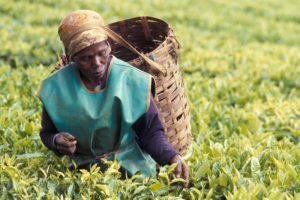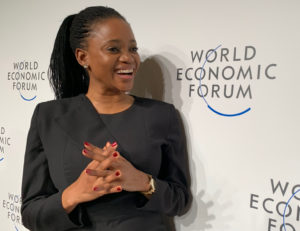Botswana welcomed its fifth President Mokgweetsi Eric Keabetswe Masisi in April 2018 who succeeded President Ian Khama. In the new cabinet, 31 year old Bogolo Joy Kenewendo was appointed the Minister of Investment, Trade and Industry, making her the youngest minister in Botswana’s history. The appointment became an instant internet sensation with many Africans applauding Botswana.
Meet Botswana’s new Minister of Investment, Trade & Industry, Bogolo Joy Kenewendo (30). She also holds the record as having been youngest MP in the country. Bogolo has BA Economics & MSc International Economics degrees. pic.twitter.com/YoJU6hpbwH
— Uncle Solomon (@SolomonAshoms) April 5, 2018
This reaction was also a reflection of the yearning for a much needed change in the current political leadership makeup- dominantly older male, in many countries on the continent.
Can't keep calm! @BWGovernment just appointed Bogolo Joy Kenewendo, Minister of Investment, Trade and Industry. She is 31!
Africa, we can't go nowhere if we continue to block potential & skills of young people, young women in particular! #Botswana continue to set the bar high pic.twitter.com/Kb2bm6PBmj— Rosebell Kagumire (@RosebellK) April 5, 2018
Kenewendo was not new to the game or to the stage. She had earlier been the youngest member of parliament in the country and had worked as a trade economist in Ghana’s Ministry of Trade and Industry. She is currently adviser to the UN Secretary-General on digital cooperation. I caught up with Kenewendo in Dalian, China on the sidelines of the World Economic Forum meeting. She says she was honored by the call to serve and surprised by the way the world responded.
AF: What are those experiences that have been key to your success as a leader? Who were your influences?
Bogolo Kenewendo: I’m from a remote village in the central district of Botswana. I grew up witnessing so much poverty, I wanted to do better. There was also so much togetherness, selfless service to the community within the community. My community influenced me and the world inspired me. I started out smaller campaigns like litter picking campaigns and the volunteer/service spirit was nurtured over time into bigger and better things.
AF: In a continent where there are few young people visibly in public leadership, what do you see as major challenges to inclusive leadership?
BK: Belief that young people can’t be leaders and don’t belong or have no space at the table. This is actually quite absurd given that all major revolutions in the world have been led by young people. Patrice Lumumba was a 29 year-old Prime Minister of DRC when he was assassinated, Graça Machel was Minister of Education in her 20s as well in Mozambique. I can draw a long list yet beliefs remain. Other than beliefs, resources pose a challenge to inclusive leadership. It’s becoming increasingly expensive to organize people either in a civic form let alone in politics and this will keep many away from public leadership.
AF: Many countries on the continent have registered high economic growth but little on equal growth, What key investments must be made to reduce inequality?
Infrastructure and Education. Access is key to unlocking opportunities. Roads open access to markets, communication networks open access to the world and financial markets, access to financial markets brings opportunity for wealth creation.
AF: How do you see the journey so far made towards women’s financial inclusion and independence both in Botswana and the continent?
BK: There is good progress, however more can be done to unlock access to credit and insurance. We should not only focus on linear access but on the depth of access. The two important aspects of access beyond having a savings are access to credit to build (businesses and homes) and insurance to protect wealth generated.
AF: Economic violence disproportionately affects women, from land ownership to capital access and wage gaps, how do we guarantee more economic rights for women?
BK: This is such a complex question. Most of what we are seen as fit for has been culturally shaped. In some instances the traditional practices have been institutionalized. We are seeing small changes now in our laws. We recently amended our Land Act to allow married women to own land and we saw the South African parliament make a similar amendments. I believe we need more women in leadership who can push for the necessary changes and men who can also be champions of equity.

AF: Often agreements and economic policies are drafted without voices of ordinary people and women. What challenges do arise from the lack of representative policy making? How can we fix this?
BK: I think countries do things differently, in Botswana we run thorough consultations with groups around the country before we ratify agreements including with women who are basket weavers because they are traders. I am aware that the system isn’t perfect and I’m continuously trying to make it more inclusive. We recently ran a policy hackathon that roped in different groups from all over the country including satellite groups online that contributed to the final document I presented in parliament. I hope this kind of inclusion will also create a sense of ownership in the implementation of the policies.
AF: What lessons can we learn from Botswana on leadership and equitable economic growth?
BK: We can always do better. I am a traditionalist in some respects. In Botswana the government holds the rural and traditional courts highly and uses them as a key consultative and engagement/ participation platform. The Kgotla system (customary court/public meeting) has now been copied and exported by thought leaders in leadership. Recognizing Tribal Management of inclusivity, a community spirit and ensuring that each gets the chance to voice his or her opinions every stage along the way is important. Echoing the true meaning of Lekgotla “I am because we exist” which in the west is democracy ‘for the people, by the people’
AF: As one of the few women at these economic tables, national and continental, do you generally meet resistance and high expectations? How do you deal with failure?
BK: Leading this ministry and working for the people of Botswana is an everyday highlight. Every moment has been quite intense because I’m aware that many people’s hope rely on this ministry and our cooperation with the rest of government. I thank God every day for the strength, wisdom and joy (especially in the face of adversity) he gives me to do this role. I don’t really like responding to the question ‘What do you bring’ because I seldom hear it posed to my male colleagues and I feel it reinforces that women have to work twice as hard and always prove that they too belong at the table. I meditate. I don’t fear failure. I take a breath and learn from it and build on it.

AF: How do you use your privilege to uplift other young people and women? What advice would you give to young African women interested in leadership?
BK: Never let anyone make you believe that you are not enough. You are enough. Public spaces, leadership spaces, money spaces are female spaces too! The most important thing is to ensure we are not comfortable in being the ‘only woman’ at the table. Any space can do with diversity. Please be your sister’s keeper, send the ladder down, extend a hand ( a helping one, even a comforting one will be most welcome).
I like mentoring, connecting and opening doors for people. I have made sure that all State Owned Enterprise (SOE) boards under the ministry I head now have at least two new young people. This is definitely a move made with resistance but it needed to be done.
